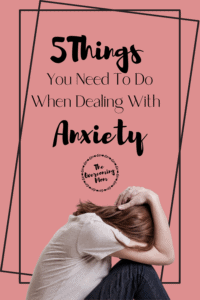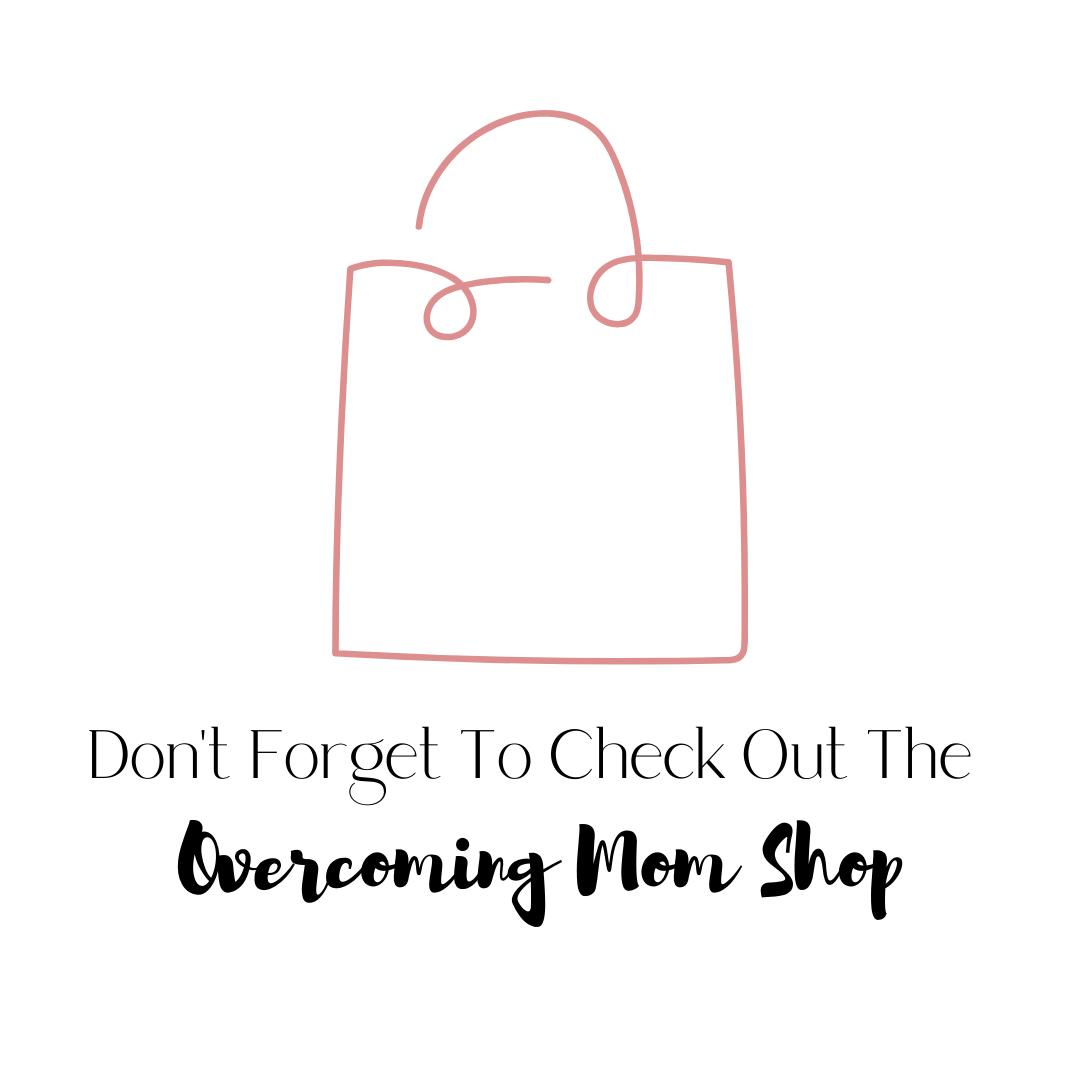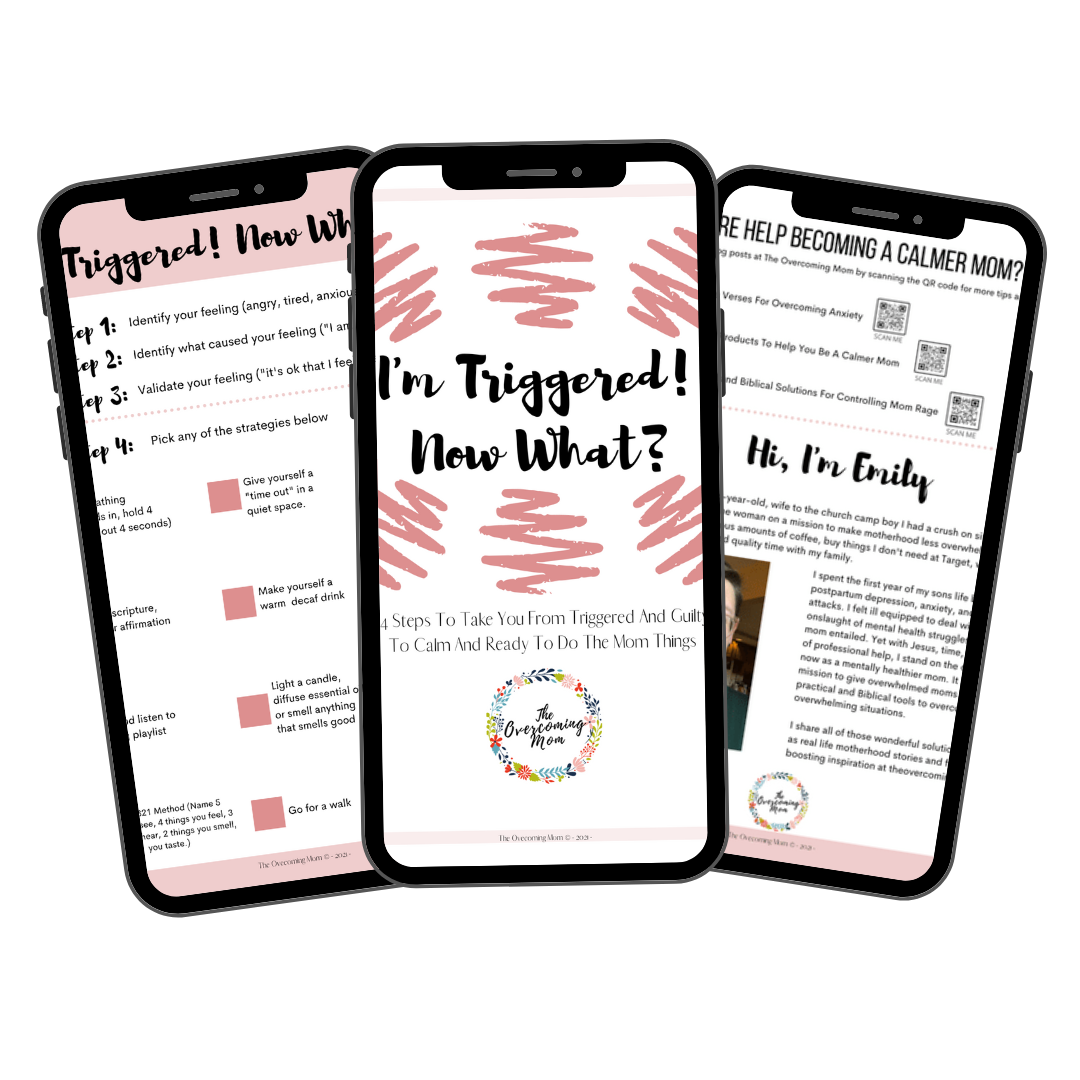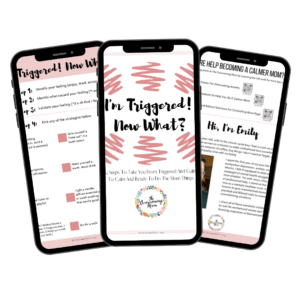This page may contain affiliate links. As an Amazon Associate I earn from qualifying purchases. If you want more information, please see my Affiliate Disclosure.
I have struggled with anxiety almost my entire life. Growing up I was told to “suck it up,” or “stop being worried,” regularly. It’s no surprise that when I grew up, I had no idea how to combat anxiety in a way that was healthy and validating. As an adult, I would insult, belittle, or minimize my fears instead of come to terms with them. It’s no surprise that doing those things made my anxiety much worse as an adult. It wasn’t until I battled postpartum depression that I finally learned how to cope with and overcome anxiety in a way that wasn’t belittling but empowering.
According to the ADAA, anxiety disorders are the most common mental health illnesses in America, affecting around 18% of the population. Anxiety disorders are highly treatable, but only about 37% of people with anxiety disorders receive treatment. That means there are many people struggling with anxiety who know no healthy way of coping. I wonder how many people fight anxiety every day, only to combat it with negative self-talk and self-deprecation. Perhaps if we knew of a healthier way of coping with anxiety, we could learn how to live a life overcoming it day by day!
I practice these strategies often, and I can attest to their effectiveness. These tips are also recommended often by health care professionals. Instead of hating yourself for having anxiety, let’s work on healthy strategies to cope and overcome anxiety today!

1- Validate your anxiety
One of the most powerful things you can do when dealing with anxiety is to validate how you feel! When you give yourself permission to feel, you give yourself permission to heal!
More than likely, your anxiety is stemming from something real, whether the thing that triggered your anxiety is rational at the moment or not. The life issues you’ve experienced that contribute to having anxiety are not fake, and are not things that you can wish away. Therefore, when you invalidate your anxiety, you in turn make it worse.
You are allowed to feel. Even if at one point you were told your anxiety was invalid, or just an attention grabber, you are allowed to feel. Give yourself permission to feel, because holding it in, or invalidating it, can actually make it worse. It’s like shaking up a soda can, but never opening it. At some point, the soda can is going to do what it needs to do to relieve the pressure, which is exploding. When we give ourselves validation for our feelings, it’s like opening up the shaken soda can slowly. We slowly let that pressure out safely, so we can enjoy the end product without having to clean up an emotional mess afterward.
Here’s some ways you can validate how you feel:
- “I’m feeling very anxious right now. I’m allowed to feel this way. This is a stressful situation.”
- “When my kids fight, it stresses me out. This is a normal feeling. I’m allowed to feel this way.”
- “When my spouse and I disagree, it makes my heart race. It’s ok if disagreements make me anxious.”
- “When the baby cries, it makes me upset. This is normal. I’m allowed to be upset when my child is upset”
Notice how none of those phrases say anything like, “I’m stupid for feeling this way,” or “I’m a bad mom/wife/human.” We are not bad people for struggling. We are simply people. Give yourself permission to feel like a person.
2- Don’t try to make yourself “get over it”
This goes along with the first point. When you don’t give yourself permission to feel, you are actually bottling up your emotions, which never work out. When you bottle up feelings (or make them invalid in your life), eventually they’re going to blow up in your face. Instead of telling yourself to “get over it,” allow yourself to feel. Give yourself permission to be upset, or anxious, or angry, or whatever emotion you’re feeling at the moment.
I love my parents, and I have a wonderful relationship with them, but growing up I wasn’t taught to allow my emotions to exist. If I ever felt sad, I was immediately told to “get over it”. This made me believe that feeling negative emotions made me a bad person. Many people have experienced similar upbringings around emotional awareness. When we correlate negative feelings with being a bad person, we never allow ourselves to get to the why behind our feelings. This is why allowing yourself the space to feel is necessary.
This DOESN’T mean that you get a right to act out on those emotions! Allowing yourself to feel emotions is not an invitation to be abusive to loved ones, or rude to strangers or acquaintances. Giving yourself permission to feel doesn’t mean you get to be destructive to property or reckless. It might mean you give yourself time to cry in your room, or vent your frustrations to a loved one or a professional, or even to walk away from a frustrating situation. Don’t mix up having permission to feel with having permission to be a jerk.
When experiencing a highly anxious moment, find a safe space to allow yourself to feel. You may be surprised at how relieving it can feel when we allow ourselves to experience emotions with self-validation. If you’re struggling with self-validation, take a look at the phrases above. Use those as starting points for yourself. Instead of telling yourself to “just get over it,” tell yourself it’s ok to feel.
3- Identify what triggers your anxiety
This is hands down been the most beneficial thing I have ever done in combating anxiety! When I started actively paying attention to how certain situations made me feel, it gave me the ability to prevent moments of anxiety from happening. Of course, this isn’t completely foolproof. There will be moments when you will be triggered, but being prepared for it can make it happen much less.
In case you don’t know, a trigger is something that happens that sets off a memory or feeling that takes you back to a moment of trauma in your life. For many people who deal with anxiety, there are some sensory stimulus’ that can set off feelings of anxiety or stress. This can range from a smell or sound, or even a song or certain foods. Triggers vary greatly from person to person, and can be deeply personal.
For me personally, I found two things that would frequently trigger panic attacks for me. If I was very tired, or I felt touched out, it would often result in huge levels of anxiety for me. On days when I don’t sleep well at night, or I’m having to hold my child more than usual, or in general if I’m feeling touched out, I find myself battling anxious feelings more.
When you make yourself aware of the things that trigger your anxiety, you can then prepare preventative measures. For example, if being tired makes you anxious, then focus on getting more rest at night. If being hungry makes you more anxious, then focus on keeping yourself fed throughout the day. Therapy can be wonderful for helping identify triggers.
4- Give yourself a break
Anxiety is a common symptom of sensory overload. When you spend an entire day being treated like a treehouse by your toddlers, someone who is sensitive to touch can experience high levels of anxiety. Same goes for those who are sensitive to noise, or smells, or visual stimuli, or anything else for that matter. Sometimes the best thing you can do to curb anxiety is to walk away from what’s overstimulating you.
As a mom, this is way easier said than done! Some moms are single moms, and don’t get the luxury of going on a solo drive to the nearest coffee place. Other moms are inundated with responsibilities around the house, and wouldn’t know what to do with a break if it hit them in the face.
A break doesn’t have to be fancy, and it doesn’t have to be lengthy. Sometimes the best break you can give yourself is sitting in your room for 10 minutes. Other times it might be reading a book while your kids watch TV. Sometimes the more simple the break is, the better it is.
Do NOT mistake a break for completing a task! For example, a break is NOT going grocery shopping (unless you really enjoy grocery shopping, then shop on). Taking a shower is NOT a break! Taking care of you or your family’s basic needs is NOT a break! A break is doing anything purely for yourself!
If you’re looking for some quick ways to care for yourself and your spirit, check out my blog post, “5 Minute Self Care for the Christian Woman.”
5- Forgive yourself
An unfortunate side effect of suffering with anxiety is guilt. Many people who struggle with anxiety feel guilty about it, and often times beat themselves up for how they feel. The “get over it” mentality keeps them from taking care of themselves in a way they deserve.
Remember that anxiety is not a reflection of who you are as a person. Therefore, you are worthy of love and worthy of all things good in your life. So when you go through rough moments with your mental health, forgive yourself.
Even if your mental health struggles have caused you to isolate or inadvertently hurt your loved ones, give yourself grace. Nobody asks to struggle, and the only way you’re going to make progress in healing is if you stop torturing yourself with guilt. When you forgive yourself, you take the pressure off yourself and give yourself more room to make progress in your healing.
You are a human, and humans struggle. If your child were experiencing anxiety, you wouldn’t hate them for it. You would hold them, and help them through their struggle. You’d comfort them, and let them know you’re there for them. Why shouldn’t you do the same for yourself?
Bonus Tip: Don’t be afraid of professional help
For some reason, many Christians are terrified of seeking professional help for their mental illnesses. Some Christians believe that receiving professional help is somehow a sign of a lack of faith in God. I STRONGLY disagree with that. I won’t go into detail in this post, but if you want to know more about this topic, check out my post, “Should Christians Go To Therapy?”
Sometimes people don’t get help for their mental illnesses because of stigma, while others don’t seek professional help because of personal guilt. Talking to a therapist, or other mental health professionals, can be hugely beneficial in identifying the root causes of your anxiety. They can be helpful in helping you take active steps in coping and overcoming your struggles, and if necessary, they can help you start a treatment plan.
For me, seeking professional help was one of the only ways I was able to identify the things triggering anxiety in my life. This is why I think therapy can be one of the most beneficial things anybody can do for their lives. If doing the above tips doesn’t seem to help enough for you, then I highly suggest seeking out professional help. There is never any shame in seeking professional help, and for many, it is truly a life saver.










